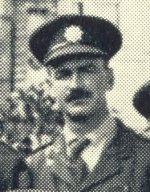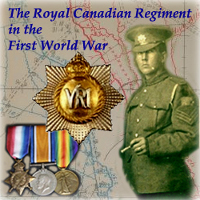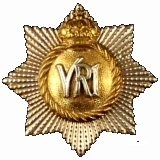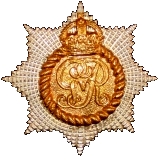
The First World War
Officers of The Royal Canadian Regiment
Lieut. Percy Beaumont
Soldiers of the First World War database entry - P. Beaumont

Lieut. Percy Beaumont (1918)
Service:
- THE LONDON GAZETTE, JULY 25, 1899; 5th and 6th Battalions, the Lancashire Fusiliers, Percy Beaumont, Gent., to be Second Lieutenant. Dated 11th July, 1899.
- THE LONDON GAZETTE, FEBRUARY 26, 1901; 6th Battalion, the Lancashire Fusiliers, The undermentioned Second Lieutenants to be Lieutenants:- P. Beaumont. Dated 18th January, 1901.
- Lieut 32nd Batt. Imp. Yeomanry, 1901
- S.A. War (afield 5 months after declaration of Peace) Dec 1899 - Dec 1902; King's and Queen's medals with 5 clasps
- London Times, 26 Sep 01 (Thursday) The Victorian left for England Sep 20 with the following on passage home: 6/Lancashire Fusiliers - P Beaumont. Due Southampton Oct 11.
- THE LONDON GAZETTE, MARCH 11, 1902; To be Lieutenants, with the temporary rank of Lieutenant in the Army:- Lieutenant P. Beaumont, 6th Battalion the Lancashire Fusiliers. Dated 30th January, 1902.
- THE LONDON GAZETTE, MARCH 18, 1902; The undermentioned Officers are seconded for service with the Imperial Yeomanry in South Africa:- 6th Battalion, the Lancashire Fusiliers, Lieutenant P. Beaumont. Dated 30th January, 1902.
- London Times, 25 Dec 02 (Thursday) The Avondale Castle left for England December 16, with the following on passage home: 32/Imperial Yeomanry - Lieutenant P Beaumont. Due Southampton January 7.
- THE LONDON GAZETTE, FEBRUARY 24, 1903; THE IMPERIAL YEOMANRY (IN SOUTH AFRICA):- Lieutenant P. Beaumont relinquishes his Commission. Dated 7th February, 1903.
- THE LONDON GAZETTE, SEPTEMBER 18, 1903; Lieutenant Percy Beaumont, from 6th Battalion, The Lancashire Fusiliers, to be Second Lieutenant. Dated 19th September, 1903.
- S. Lancs Regt., 1st and 2nd Batts - July 1903 to 1906
- Served in India 1904-06
- Resigned Commission on marriage whilst on sick leave to England
- THE LONDON GAZETTE, JUNE 18, 1907; The Prince of Wales's Volunteers (South Lancashire Regiment), Second Lieutenant Percy Beaumont resigns his Commission. Dated 19th June, 1907.
- SUPPLEMENT TO THE LONDON GAZETTE, 24 SEPTEMBER 1914 - The undermentioned are granted the temporary rank of Lieutenant: Dated 25th September, 1914. - Percy Beaumont
- SUPPLEMENT TO THE LONDON GAZETTE, 23 AUGUST, 1915; The Royal Fusiliers (City of London Regiment) 17th Battalion (Empire) - Temporary Captain P. Beaumont relinquishes his commission. Dated 24th August, 1915.
- Service in ranks 23 Jun 1916 to 13 Jul 1917, attested for 97th Battalion, C.E.F., regimental number 1033027
- Pte; 23 Jun 1916
- A/CSM; 25 Sep 1916
- Pte; 23 Jan 1917 (Many soldiers voluntarily accepted reduction in rank in order to join a draft for France.)
- A/Sgt; 1 Aug 1917
- Gazetted Lieut. 4 Nov 1917
- Lieut Beaumont was court-martialed in 1918, see description below in Lieut Robert England's notes. Charges were from the following sections of the Army Act: 9(2) - Disobeying a superior officer; 15(1a) - Absence without leave; 16 - Disgraceful Conduct; and 40 - Conduct to prejudice of good order and military discipline. (Lieut Beaumont is recorded as belonging to the 17th Res Bn. at the time of his Court Martial.)
- Arrived France 23 Aug 1918
- Joined The RCR from CCRC 30 Aug 1918
- Courses
- Hythe Schol of Musketry (Officers')
- Revolver and Gas, Bramshott
- Wounded in action 30 Sep 1918
- The Canada Gazette, 22 Nov 1919 - No. 4 District Depot (Montreal) - The undermentioned officers are struck off the strength of the C.E.F. on general demobilization: Lieutenent Percy Beaumont, medically unfit. 17 Sep 1919.
- Reported in the September 1926 Connecting File: "Lieut. P. Beamont: last address, 33 Eintrachstrasse, Cologne, Germany."
1910 Petition for Bankruptcy against Percy Beaumont
THE LONDON GAZETTE, OCTOBER 14, 1910.
In the High Court of Justice.--In Bankruptcy.
In the Matter of a Bankruptcy Petition, filed the 30th day of September, 1910.
To P. BEAUMONT, of 8, Luxburgh House, Northumberland-street, St. Marylebone, in the county of Middlesex, lately an Officer in His Majesty's Army (South Lancashire Regiment).
TAKE notice, that a Bankruptcy Petition has been presented against you to this Court by Partabmull Soorting, carrying on business as P. Soorting and Co., of 116, New Bazaar, Poona, in the Empire of India, and the Court has ordered that the publication of this notice in the London Gazette and in the Daily Telegraph 1910. newspaper shall be deemed to be service of the petition upon you; and further take notice, that the said petition will be heard at this Court on the 25th day of October, 1910, at 11 o'clock in the forenoon, on which day you are required to appear, and if you do not appear the Court may make a Receiving Order against you in your absence. The petition can be inspected by you on application at this Courb. Dated 8th day of October, 1910.
H.S. GIFFARD, Registrar.
RISING and RAVENSCROFT, 9, King Williamstreet, London, B.C., Solicitors for the Petitjoning Creditor.
Order Received Agaisnt Percy Beaumont in Bankruptcy Petition
THE LONDON GAZETTE, OCTOBER 28, 1910
The Bankruptcy Acts, 1883 and 1890; Receiving Orders
- No. 3196
- Debtor's Name - Beaumont, P.
- Address - 8, Luxburgh-house, Northumberland-street, St. Marylebone, Middlesex.
- Deescription - Lately an Officer in His Majesty's Army, South Lancashire Regiment.
- Court - High Court of Justice in Bankruptcy.
- Sept. 30, 1910
- No. of Matter - 1134 of 1910
- Date of Receiving Order - Oct. 25, 1910
- No. of Receiving Order - 599
- Whether Debtor's or Creditor's petition - Creditor's
- Act or Acts of Bankruptcy proved in Creditor's Petition - Sec. 4-1 (G.) Bankruptcy Act, 1883 (i.e, Acts of Bankruptcy.- (1) A debtor commits an act of bankruptcy in each of the following cases:- (g) "If a creditor has obtained a final judgment."
Recollections of a Nonagenarian of Service in The Royal Canadian Regiment (1916-19), by Robert England, M.C. (See full text)
I was particularly delighted by the commissioning of men who had served with me in "C" Company or in Scouts and Bombers, such as Lieut. H. Brealey, M.M., Lieut. Barrett-Lennard, M.C., Lieut. J. W. Miller, M.M., Lieut. D. A. Porter, M.C., and a rather odd case, Lieut. Percy Beaumont. I first noticed Private Beaumont (South Africa ribbons) in my platoon in 1916 spreading a handkerchief to eat from his mess-tin, always rather cheerfully welcoming rum issue, inclined to mention names of abstainers releasing, as he seemed to imply, a more adequate supply. He had been a staff captain in the Boer War, a professional soldier but his drinking habits had brought about his dismissal. He was a competent brave soldier, spoke French and German, his wife was French of good family and the owner of property at Lens, and in 1917 when he saw the ruined coal-mines, he used to say that the Germans would have to pay for all the destruction caused. In 1918 he requalified at the Canadian Cadet School at Bexhill for a commission in the C.E.F., but he celebrated his regaining his status too well, failing to report for duty at Bramshott. While I was courts-martial officer at 17th Reserve, the Assistant Provost Marshal asked me if I knew him and told me he had gone to Liphook station to pick Beaumont up, but learned afterwards that the officer concerned had fallen asleep and arrived at Portsmouth. Within a few days Percy Beaumont was delivered to our orderly room at 17th Reserve by his long-suffering and splendid wife, and placed under arrest.
Now the ball was in Percy's court, and he played it with all the aplomb and assurance of an old regular. He chose his venue of trial—the Horse Guards in London. He listened to advice, and chose for his lawyer an able 85th captain called Baker, a barrister. Percy was quite aware that old British Army regulars counted "cashiering" and such-like penalties with social ostracism—a verdict to be abhorred when a man had re-won his spurs on the battlefield of France after mis-fortunes; they were more likely to be tolerant than a Canadian court-martial, anxious to comply with the letter of King's Regulations and Orders and Military Law, and seeing little distinction between dismissal and cashiering. Percy was right—he was reprimanded and his sentence duly promulgated at the Horse Guards. Back Beaumont came to parade before Col. Muirhead at 17th Reserve, Bramshott, asking for his Sam Browne belt and to be returned to duty. The C.O. said that, as far as he knew, Beaumont was still under arrest. Percy explained that he had been reprimanded and his sentence promulgated at the Horse Guards, and he was ready for duty.
The C.O. said he had no advice, but would enquire. Percy then said, "May I have the privileges of the Mess, sir?" The C.O. said "I suppose so." So Percy for nearly a week had no duty and time to drink and relate how pleased old so and so, etc., of his early days in the British Army (now of senior rank on his court-martial) were to see him and to learn of his service with the Canadians.
In the Cambrai battle Percy Beaumont gave splendid service. I recall him whistling his men and yelling "Taxi," when I'd pointed out the map locations, heads bobbing up and down and men moving quickly under his shrewd assessment of terrain and enemy shelling incidents. Later in the attack, he retrieved a bottle of rum from Lt. Mills just killed saying to me "Mills followed that tank too closely, risky to get too close but I had to get this water-bottle!" He offered me a drink but I noticed the mud and gore and it was unappetizing.
In 1918 I saw Percy Beaumont at Ripon ready to be demobbed. One day I found him outside of his hut having a haemorrhage into a pail held by his batman and saw him off in an ambulance to the hospital. After a week I heard bad news about him and hastened to see him to say "Good-bye" before repatriation to Canada. I found him cheerful, he remarked that doctors gave him only 3 months to live and that he had had his bed moved so that he could see the legs of the WAACS going by. In 1923, when studying at the Sorbonne, I had occasion in Paris to go to Cook's for currency exchange and ran into Percy Beaumont, bowler-hatted and debonair, with a whiff of whiskey on his breath, ready for a party had I been willing—still in trouble with authorities, blasting British Embassy officials who had been enquiring about his movements and activities in the Saar where French Army was in occupation. "Look" Percy said "I'm a millionaire" and showed me German money then depreciating like an avalanche. I had seen Percy Beaumont, when wounded at Cambrai, being borne on a stretcher by German prisoners, smoking a cigarette, and certainly in command in German. I wondered what he had really been up to that made the Embassy people inquisitive. It was my last sight of this old regular (but most irregular) British Army officer, yet I can use such words as duty, cool courage, about a part of his life in the Royal Canadian Regiment in battle and on the march.
Date of Birth - 29 Dec 1880; Lille, France
- The O'Leary Collection; Medals of The Royal Canadian Regiment.
- Researching Canadian Soldiers of the First World War
- Researching The Royal Canadian Regiment
- The RCR in the First World War
- Badges of The RCR
- The Senior Subaltern
- The Minute Book (blog)
- Rogue Papers
- Tactical Primers
- The Regimental Library
- Battle Honours
- Perpetuation of the CEF
- A Miscellany
- Quotes
- The Frontenac Times
- Site Map

![]() The RCR in the Great War
The RCR in the Great War
![]() War Diary
War Diary
![]() Battle Honours
Battle Honours
![]() Battle Bars and The RCR
Battle Bars and The RCR
![]() The RCR Battle Bar Ledger (pdf)
The RCR Battle Bar Ledger (pdf)
![]() Honours and Awards
Honours and Awards
![]() Roll of Honour
Roll of Honour
![]() Prisoners of War
Prisoners of War
![]() Cemetery List
Cemetery List
![]() Cemetery Map
Cemetery Map
![]() Courts Martial
Courts Martial
![]() Officers
Officers
![]() RSMs of The RCR (1914-1919)
RSMs of The RCR (1914-1919)
![]() NCOs and Soldiers
NCOs and Soldiers
![]() An Officer's Diary (1914-1918)
An Officer's Diary (1914-1918)
![]() Recollections of a Nonagenerian (R. England) (1916-1919)
Recollections of a Nonagenerian (R. England) (1916-1919)
![]() On to Bermuda (1914-15)
On to Bermuda (1914-15)
![]() England and France 1915-1916 (Hayes; 1931)
England and France 1915-1916 (Hayes; 1931)
![]() Overseas with The Royals (1915)
Overseas with The Royals (1915)
![]() Regimental History Pamphlet (1917)
Regimental History Pamphlet (1917)
![]() Amiens (1918)
Amiens (1918)
![]() Cambrai (1918)
Cambrai (1918)
![]() Monchy-le-Preux (1918)
Monchy-le-Preux (1918)
![]() Under-aged Soldiers in The RCR
Under-aged Soldiers in The RCR
![]() Not All Were Volunteers; The RCR and the Military Service Act
Not All Were Volunteers; The RCR and the Military Service Act
![]() Sentenced to Death by Court Martial
Sentenced to Death by Court Martial
![]() The 7th Trench Mortar Battery
The 7th Trench Mortar Battery
![]() A Regimental Goat
A Regimental Goat
![]() Regiment and Family, Bermuda 1914-15
Regiment and Family, Bermuda 1914-15
![]() "March the Guilty Bastard In"
"March the Guilty Bastard In"
![]() Surrendered as Stowaway
Surrendered as Stowaway
![]() Re-Visiting the Great War Roll of Honour for The RCR
Re-Visiting the Great War Roll of Honour for The RCR
![]() Canadian Corps Trench Standing Orders (1916)
Canadian Corps Trench Standing Orders (1916)

